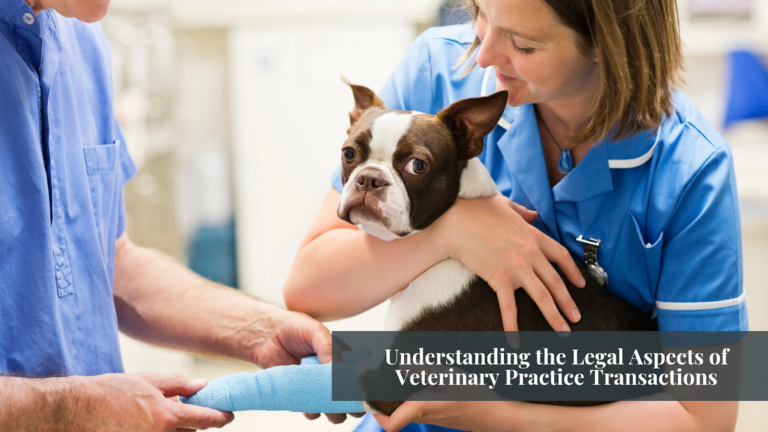Veterinary practices, like any other healthcare business, are now more prone to complex transactions, including mergers, acquisitions, and sales. Such business deals involve extensive legal concerns that can significantly affect the outcome of a given transaction.
As either a buyer, seller, or party to a merger, understanding the legal issues in question is important, as it will protect your interests or lead you through a possible transaction.
It will help to break down the legal elements that are necessary within the contract of the vet practice transaction on due diligence, contractual obligations, employment law, compliance, and post-transaction obligations.
Due Diligence: The Backbone of a Deal
In a nutshell, due diligence refers to detailed review and appraisal of a veterinary practice before its purchase, sale, or merger. Both the buyer and seller have to carry out due diligence so that every detail related to the veterinary practice, be it financial, operational, or legal procedures, can be understood.
Due diligence, from the buyer’s side, would entail perusing profit and loss statements, balance sheets, tax returns, or any other relevant financial information to evaluate whether the practice is viable financially.
Employee agreements and employment-related matters are another important area of due diligence. The buyer needs to scrutinize all these contracts and consider whether such agreements can be transferred or renegotiated for favorable terms.
Probably for the very first time, veterinary practices rely on highly skilled staff-the veterinarians, technicians, and administrative support-so therefore it is very fundamental to understand the existing employment framework, embracing employment contracts, benefits, and any issues of labor law compliance.
Also, the buyer should ensure that the practice is fully in compliance with the state and federal levels of regulations. This is checking whether there are existing valid licenses, and also whether the practice has some pending legal litigation or regulatory infractions.
Contracting and Structuring the Deal
Once the due diligence process is accomplished, the next steps in selling vet practice to corporate involves negotiating and drafting contracts. The most critical document at this stage is the Purchase Agreement; it provides the special details of the transaction.
Of course, one of the most important elements of the Purchase Agreement is the purchase price and, thereby, the terms of payment. It can be a straight payment, a pay-meant installment, or seller-financing. The sales structure is also very important. Veterinary practice transactions can be structured either as an asset sale or a stock sale.
The buyer purchases specific assets such as equipment, client lists, and goodwill with no assumption of liabilities. In the case of a sale of stock, the whole legal entity is assumed by the buyer; liabilities are involved. The use of asset sales has increasingly become more common in the veterinary industry, primarily due to the fact that it enables the buyer to avoid certain risks.
The Purchase Agreement would also have representations and warranties. These are statements provided by the seller regarding the current status of the practice as it pertains to its financial standing, assets, and its compliance with applicable law. Such assurances by the seller become a mainstay of the decision to purchase for buyers.
The legal complexities of such contracts are good enough reasons why both parties should have sound legal advice at each stage of drafting and negotiations. These contracts may be legally binding, and may go on to govern the very foundation of the transaction with long-run implications for both buyer and seller.
Employment Law in Veterinary Practice Transactions
This would also encompass an awareness of employment law in terms of the transfer of employees and future employment contracts in veterinary practice transactions. All veterinary practices have veterinarians, technicians, and administrative staff who are all integral to the business, and employment law is relevant to these matters.
In other cases, the buyer may wish to retain all or most of the existing staff. This will involve new employment contracts with new terms of employment under the practice’s new ownership. Terms relating to compensation, benefits, and other conditions of employment may be required to be changed.
The practice of the buyer also ought to be harmonized with the observance of all laws pursuant to which labor is governed, including those dealt within the FLSA that states requirements regarding minimum wages, overtime work, and work hours.
Another crucial aspect of employment law in the deals would be ensuring that all benefits programs, including health insurance and retirement plans, are legal.
The practices also have to pay attention to contracts with key employees like associate vets. Such arrangements often have to be renegotiated to ensure that the services are uninterrupted and do not disturb the stability of the practice at a time when change in ownership is taking place.
Regulatory Compliance Considerations
The veterinary practices involved operate in a highly regulated environment; hence, regulatory compliance is a very integral part of every transaction. The federal as well as state and local regulations provide for the operation of veterinary practices and indeed sweep in scope of covering such essentials as professional licensing through controlled substance handling.
Before finalizing the deal, the buyer should ensure that the practice is compliant with all regulations. This involves reviewing whether all licensures for both the practice and individual veterinarians are current and valid. At the time of sale, there should be no lapses in licensure, nor any such disciplinary actions pending.
Veterinary practices that distribute or prescribe controlled substances fall under certain requirements of the Drug Enforcement Administration (DEA). In acquiring a practice, ensure that their dispensing procedures, storage, and documentation of all controlled substances are correct.
In addition, veterinary practices must comply with OSHA standards related to workplace safety, hazardous materials, and infection control. Thus, the company’s ability to adhere to OSHA standards would ensure the safety of the employees and avoid regulatory penalties.
Post-Transaction Considerations
After the transaction, it will be the responsibility of both parties to ensure the handover is carried out in a manner that does not interrupt the smooth flow of operations of the practice while at the same time upheld legal agreements agreed during sale.
The buyer should focus on assimilating the new entity within his /her set up handling relationships with the existing staff, clients, and suppliers. They should also ensure all their assets have been transferred and any outstanding payments made as agreed on.
As a result, sellers will face some post-closing obligations. For example, they may be subject to requirements to observe non-compete clauses or offer support in the transition phase. Adhering to such post-closing obligations is of importance because failure to do so may attract legal disputes or breaches of contract.
Communication with clients is a good practice during the post-transaction period. Buyers should notify the owners that the ownership has only changed, therefore, they should not have concerns about the quality of care or service, which will remain unchanged, thus maintaining the current client base.
Conclusion
Veterinary practice transactions are a complex mix of legal considerations-from due diligence and contract negotiations to employment law and regulatory compliance. Understanding these legal aspects is crucial for both the buyer and seller of the transaction.
Using practice attorneys, veterinarians can execute their transactions without worrying about any possible harmful effects on their business and sets the stage for long-term success in the practice. Legal implications on both ends ensure a smooth transition and pave the stage for long-term growth and stability.
FAQs
- What is due diligence in veterinary practice transactions?
Due diligence is the study of the financial, legal, and operational specifics of a practice before entering into a binding agreement.
- What is an asset sale vs. a stock sale?
An asset sale gives a buyer the purchase of specific assets of the veterinary practice, whereas a stock sale gives a buyer the purchase of the legal entity and all liabilities attached to it.
- Why are non-compete clauses important in veterinary practice transactions?
This clause restricts the seller from opening a competing practice in the same area for a specified time because it protects the buyer.

Daniel J. Morgan is the founder of Invidiata Magazine, a premier publication showcasing luxury living, arts, and culture. With a passion for excellence, Daniel has established the magazine as a beacon of sophistication and refinement, captivating discerning audiences worldwide.




